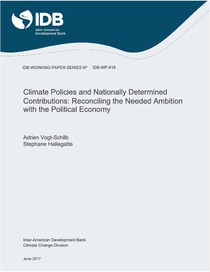Climate policies and nationally determined contributions: reconciling the needed ambition with the political economy
"Countries have pledged to stabilize global warming at a 1.5 to 2°C increase. Either target requires reaching net zero emissions before the end of the century, which implies a major transformation of the economic system. This paper reviews the literature on how policymakers can design climate...
| Main Authors: | , |
|---|---|
| Institution: | ETUI-European Trade Union Institute |
| Format: | TEXT |
| Language: | English |
| Published: |
Washington, DC
2017
IDB |
| Subjects: | |
| Online Access: | https://www.labourline.org/KENTIKA-19308385124911265679-Climate-policies-and-nationall.htm |
| _version_ | 1771659901911695360 |
|---|---|
| author | Vogt-Schilb, Adrien Hallegatte, Stéphane |
| author_facet | Vogt-Schilb, Adrien Hallegatte, Stéphane |
| collection | Library items |
| description | "Countries have pledged to stabilize global warming at a 1.5 to 2°C increase. Either target requires reaching net zero emissions before the end of the century, which implies a major transformation of the economic system. This paper reviews the literature on how policymakers can design climate policies and their Nationally Determined Contributions (NDCs) to reach zero-net emissions before the end of the century in a socially and politically-acceptable manner. To get the ambition right, policymakers can use sectoral roadmaps with targets and indicators that track progress towards zero emissions (e.g. regarding renewable power or reforestation). Indeed, monitoring economy-wide emissions reductions alone would not ensure that short-term action contributes meaningfully to the long-term decarbonization goal. To get the political economy right, climate policies can be designed so that they contribute to non-climate objectives and create coalitions of supporters. For instance, revenues from carbon taxes can fund social assistance and infrastructure investment, while reducing tax evasion and informality. To minimize social and economic disruptions and avoid stranded assets, policymakers can start with a low carbon price level and use complementary policies. Designed at the sector level, complementary policies such as performance standards or feebates for cars, building norms, or moratoriums on new coal power plants can be negotiated in partnership with local stakeholders and trigger a transition to zero carbon without creating disruptive stranded assets." |
| format | TEXT |
| geographic | international |
| id | 19308385124911265679_745b8822e9864a08a5c4aec3f6737934 |
| institution | ETUI-European Trade Union Institute |
| is_hierarchy_id | 19308385124911265679_745b8822e9864a08a5c4aec3f6737934 |
| is_hierarchy_title | Climate policies and nationally determined contributions: reconciling the needed ambition with the political economy |
| language | English |
| physical | 35 p. Digital |
| publishDate | 2017 |
| publisher | Washington, DC IDB |
| spellingShingle | Vogt-Schilb, Adrien Hallegatte, Stéphane climate change government policy gas emission sustainable development environmental policy Climate policies and nationally determined contributions: reconciling the needed ambition with the political economy |
| thumbnail | https://www.labourline.org/Image_prev.jpg?Archive=138590295677 |
| title | Climate policies and nationally determined contributions: reconciling the needed ambition with the political economy |
| topic | climate change government policy gas emission sustainable development environmental policy |
| url | https://www.labourline.org/KENTIKA-19308385124911265679-Climate-policies-and-nationall.htm |

